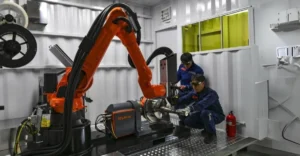Breakthrough 3D-printed intercooler technology reduces weight by over 90% in forthcoming Dutch supercar model.
Dutch performance car manufacturer Donkervoort has integrated cutting-edge cooling technology into its forthcoming P24 RS supercar, featuring a revolutionary 3D-printed intercooler system.
Developed by Conflux Technology from Australia, the metal 3D-printed component represents a remarkable engineering achievement. The air-to-water intercooler tips the scales at merely 3.1 pounds a fraction of the 35.3 pounds a conventional air-to-air intercooler of similar cooling capacity would typically weigh.
The engineering breakthrough delivers more than just weight savings. Engineers have confirmed the streamlined design has shortened the intake air path by approximately 66 percent compared to previous configurations, a modification expected to enhance throttle response and overall engine performance.
The new cooling system is set to be integrated with bespoke turbochargers produced by Dutch component manufacturer Van Der Lee, which counts the likes of McLaren and Koenigsegg among its customer base. These chargers will be integrated into Donkervoort’s newly developed “PTC engine,” which represents a move away from the Audi-based five-cylinder turbocharged engines installed in previous Donkervoort models.

The company is also stick-release-backing it’s release of the P24 RS, with the fulll unveiling scheduled for later in the year, but trickling the meatier technical details out as the days go by. Donkervoort have still stuck to the Lotus 7 ethos, keep it light, package it small.
Read more : Bambu Lab introduces modular 3D-printable toy kits
The “RS” badge has special meaning at Donkervoort, say industry watchers, because the designation has been used in Donkervoort’s past only for machines that set new levels of performance. Full performance spec’s and capabilities for the P24 RS are not released as of yet, however more information should be available in the up and coming months.
































